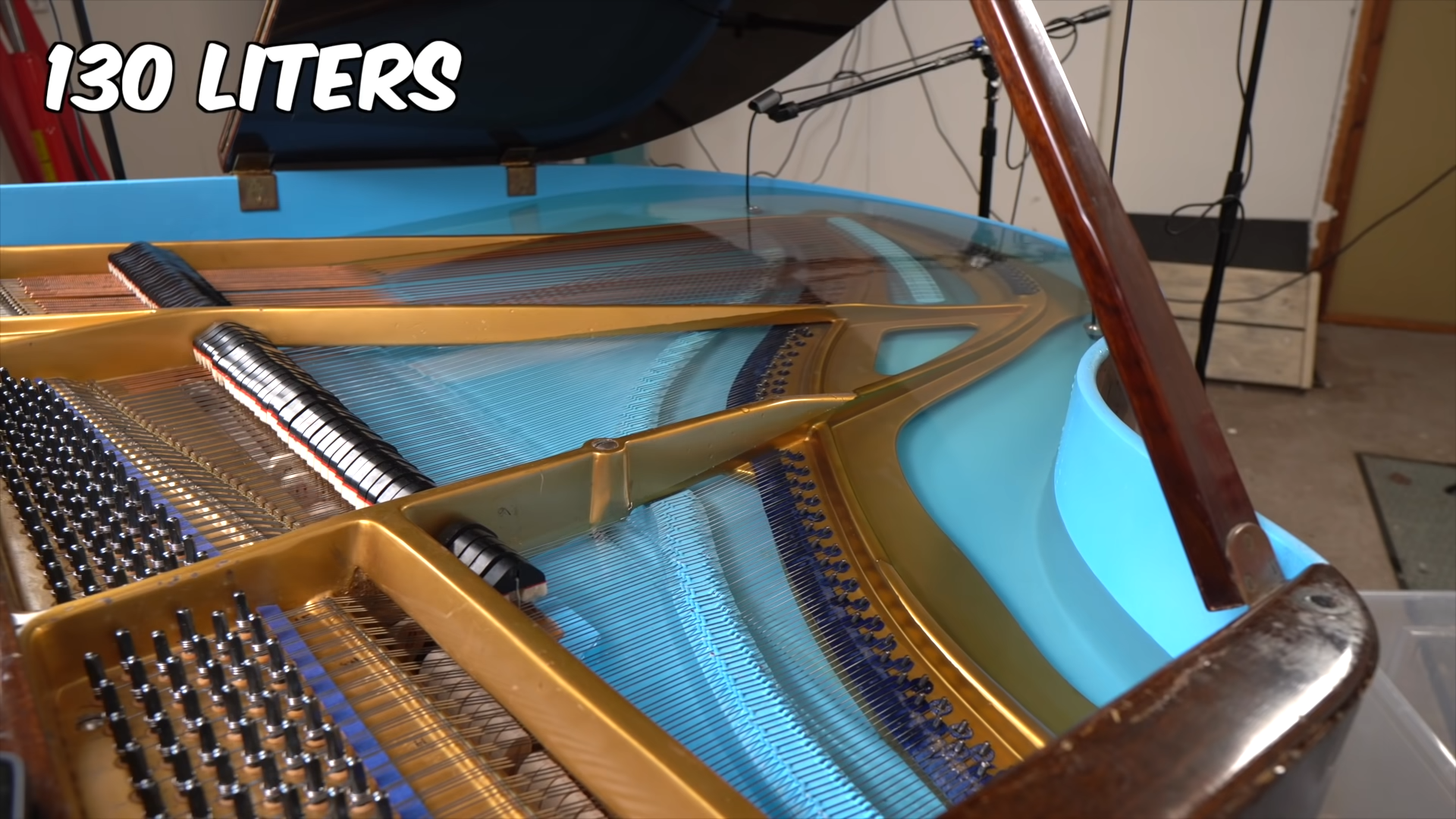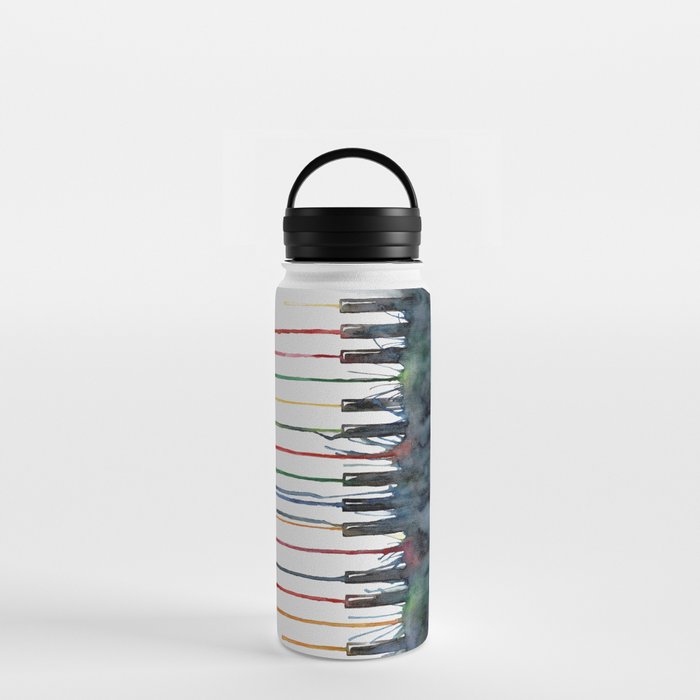Pianos do not need water. Exposing a piano to water can cause damage.
Understanding the proper care for a piano ensures its longevity and optimal performance. Unlike some plants and pets that require water to thrive, pianos are delicate instruments made from wood, metal, and felt components that are susceptible to humidity and water damage.
Managing the room’s humidity where the piano resides is crucial; too much moisture can warp wood and cause rusting of internal components, while too little can lead to cracking. A well-maintained environment contributes to a piano’s tuning stability and prevents costly repairs. Regular tuning, gentle cleaning, and avoiding liquids around the piano are key to preserving its majestic sound and aesthetic appeal. Whether you’re a concert pianist or a hobbyist, safeguarding your piano from moisture is a non-negotiable aspect of its care.

Credit: hackaday.com
The Myth Of Hydrating Pianos
You might have heard this odd advice: “Water your piano to keep it in tune.” This tall tale, known as ‘The Myth of Hydrating Pianos’, suggests that pianos need water to function properly. Let’s dive into the origins of this myth and dispel some common misconceptions.
Origins Of The Watering Practice
Long ago, someone misunderstood piano care instructions. Pianos don’t drink, but they do need stable humidity. To prevent cracks and warps, people started placing containers of water inside pianos. This practice aimed to maintain moisture levels, especially during dry seasons or in heated homes. But, does it work?
Common Misconceptions
- Pianos are thirsty: Pianos are not living things. They don’t need water.
- Water prevents detuning: It’s humidity control, not water itself that matters.
- Any piano can be watered: Adding water can cause damage if not done correctly.
So, why does this myth continue? Misunderstandings can last for ages. Yet, pianos only need correct humidity management, not a water dish.
Remember:
- Humidifiers and Dehumidifiers:
- These devices manage air moisture more effectively than water.
- Professional Advice:
- Always consult a technician, not myths, for piano care.
Pianos stay happy with the right climate, not myths about hydration. Keep your instrument in tune with true knowledge, and let myths be bygones.

Credit: www.reddit.com
Anatomy Of A Piano
Welcome to the grand world of pianos, a universe where every part, big or small, plays a crucial role in creating beautiful music. Understanding the piano starts with its anatomy, the foundation that supports its majestic sound. Let’s explore the material composition of a piano and how humidity impacts its wooden body and strings.
Material Composition
Pianos are marvels of engineering and art, crafted from various materials. The most important material in a piano is wood. It serves as the backbone of the instrument. Each wooden component, from the soundboard to the action parts, is precisely designed for durability and tonal quality. Metals such as iron and steel form the frame and strings. This combination creates a resilient structure capable of withstanding the tension of the strings and the rigors of play.
- Wood – For the soundboard, keys, and action parts.
- Iron – Used in the harp (or plate).
- Steel – For strings that produce sound.
- Felt – Cushions the hammers and dampers.
Effects Of Humidity On Wood And Strings
Humidity can be a piano’s greatest enemy. Wood and strings absorb moisture from the air, which can lead to warped soundboards and rusty strings. A stable environment ensures the longevity of these parts.
| Humidity Level | Effect on Wood | Effect on Strings |
|---|---|---|
| Low | Cracks/Contracts | Tension Decreases |
| Ideal (42-60%) | Stable | Optimal Tension |
| High | Swells/Expands | Tension Increases |
To keep a piano in tune and prevent damage, owners should use humidifiers or dehumidifiers to maintain ideal humidity levels. Regular maintenance and attention to the environment help these intricate instruments continue to produce stunning melodies for years to come.
Proper Piano Maintenance
Ensuring that your piano is well-maintained is vital for its longevity and performance. Think of your piano like a valuable piece of art. It needs care and the right environment to stay in tune and to sound its best. Weather conditions play a big role in keeping your piano in top shape. Let’s explore the ideal settings to keep your piano sounding harmonious.
Ideal Humidity Levels
Your piano prefers humidity levels between 42% and 70%. Excess moisture or dryness can damage the wood. It causes the piano to go out of tune. A consistent humidity level keeps your piano happy. Using a dehumidifier or humidifier can help maintain the ideal conditions.
Temperature And Piano Tuning
A stable room temperature is best for pianos. Extreme temperature shifts lead to tuning issues. Your instrument stays in tune longer in a temperature-controlled room. Aim to keep the temperature at a steady 20°C (68°F). This protects the internal workings and tuning stability.
Remember these points for piano care:
- Avoid placing your piano near windows or vents.
- Sudden temperature changes can cause harm.
- Use professional tuners for best results.

Credit: society6.com
Humidification Solutions
As majestic as pianos sound, they require a stable environment to maintain their tune. Wood, a crucial component of pianos, responds to moisture levels. So, keeping the right humidity is key. Let’s explore the best humidification solutions.
Room Vs. Piano-specific Humidifiers
When it comes to regulating moisture, there’s a choice: room humidifiers or piano-specific systems.
- Room Humidifiers: These devices control the humidity in the entire room. They are good for overall air quality.
- Piano-specific Humidifiers: They are installed inside or near the piano. They protect the piano even if room conditions change.
A comparison table helps decide which option suits best:
| Type | Pros | Cons |
|---|---|---|
| Room Humidifier | Improves general air quality, benefits all room furniture | May not provide consistent humidity specific to piano needs |
| Piano-specific Humidifier | Targets the piano directly, offers precise humidity control | Protects only the piano, not the rest of the room |
Using A Hygrometer To Monitor Conditions
Staying on top of humidity means measurement is crucial. A hygrometer does this job well.
- Place the hygrometer near the piano to get accurate readings.
- Check the humidity regularly to notice any changes.
- Adjust your humidifier settings based on the readings.
With a hygrometer, you can rest assured that your piano stays at its best.
Potential Risks Of Water Damage
Water can wreak havoc on pianos, causing irreversible harm. Understanding the potential risks is crucial. Here’s what you should know.
Corrosion And Mold
Moisture spells trouble for a piano’s metal components. Water accelerates corrosion, affecting strings, tuning pins, and hardware. This leads to:
- Diminished sound quality: Rusty strings can snap or detune.
- Loose pins: These make tuning a challenge.
Dampness can also lead to mold. Mold harms the wood and impacts health.
Warping And Key Sticking
Piano structures suffer when exposed to water. The wooden parts absorb moisture, swell, and change shape. This issue results in:
- Warping: A distorted piano frame harms the instrument’s integrity.
- Key sticking: Swollen keys may stick or become unresponsive.
Regular inspection can prevent these problems. Always keep your piano dry and safe from water.
Best Practices For Piano Care
Maintaining your piano ensures a lifetime of beautiful music. Like any cherished instrument, pianos require specific care. Follow these best practices to keep your piano in top condition.
Regular Cleaning Recommendations
Keeping your piano clean prevents dust accumulation and potential damage.
- Use a soft cloth to wipe down the keys.
- Avoid harsh chemicals; they can harm the finish.
- For interior cleaning, consult a professional.
Professional Inspections And Service
Regular check-ups by a qualified technician keep your piano in perfect playing condition.
| Service Type | Recommended Frequency |
|---|---|
| Tuning | Twice a year |
| Regulation | Every 2-3 years |
| Voicing | As needed |
Do Pianos Require Regular Maintenance and Cleaning?
Pianos require regular maintenance and cleaning to ensure they stay in top condition. This includes cleaning piano keys safely to remove dirt and debris that can affect the sound and performance. Regular cleaning can also help prevent discoloration and damage to the keys, keeping your piano looking and sounding great for years to come.
Frequently Asked Questions On Do Pianos Need Water
Should I Put Water In My Piano?
No, you should never put water in your piano. Adding water can cause severe damage to the instrument’s internal mechanisms and wood components.
What Does Watering A Piano Do?
Watering a piano, which refers to adding moisture, helps maintain the wood components and tuning stability. It’s essential in dry environments to prevent damage.
Is A Piano Humidifier Worth It?
A piano humidifier can be beneficial for maintaining consistent humidity levels, which helps protect your piano from damage due to climate changes. It’s a worthwhile investment for preserving your instrument’s quality and longevity.
Does A Piano Work Underwater?
A piano cannot function effectively underwater due to water hindering the movement of its mechanical parts and dampening sound waves.
Conclusion
So, to wrap things up: pianos and water don’t mix. Regular maintenance is key, but water is not part of that equation. Keep your piano dry and in a controlled environment, and you’ll enjoy harmonious melodies for years to come.
Remember, harmony in care equals harmony in sound.
{ “@context”: “https://schema.org”, “@type”: “FAQPage”, “mainEntity”: [ { “@type”: “Question”, “name”: “Should I put water in my piano?”, “acceptedAnswer”: { “@type”: “Answer”, “text”: “No, you should never put water in your piano. Adding water can cause severe damage to the instrument’s internal mechanisms and wood components.” } } , { “@type”: “Question”, “name”: “What does watering a piano do?”, “acceptedAnswer”: { “@type”: “Answer”, “text”: “Watering a piano, which refers to adding moisture, helps maintain the wood components and tuning stability. It’s essential in dry environments to prevent damage.” } } , { “@type”: “Question”, “name”: “Is a piano humidifier worth it?”, “acceptedAnswer”: { “@type”: “Answer”, “text”: “A piano humidifier can be beneficial for maintaining consistent humidity levels, which helps protect your piano from damage due to climate changes. It’s a worthwhile investment for preserving your instrument’s quality and longevity.” } } , { “@type”: “Question”, “name”: “Does a piano work underwater?”, “acceptedAnswer”: { “@type”: “Answer”, “text”: “A piano cannot function effectively underwater due to water hindering the movement of its mechanical parts and dampening sound waves.” } } ] }As an Amazon Associate, Cleanestor earns from qualifying purchases at no additional cost to you.

